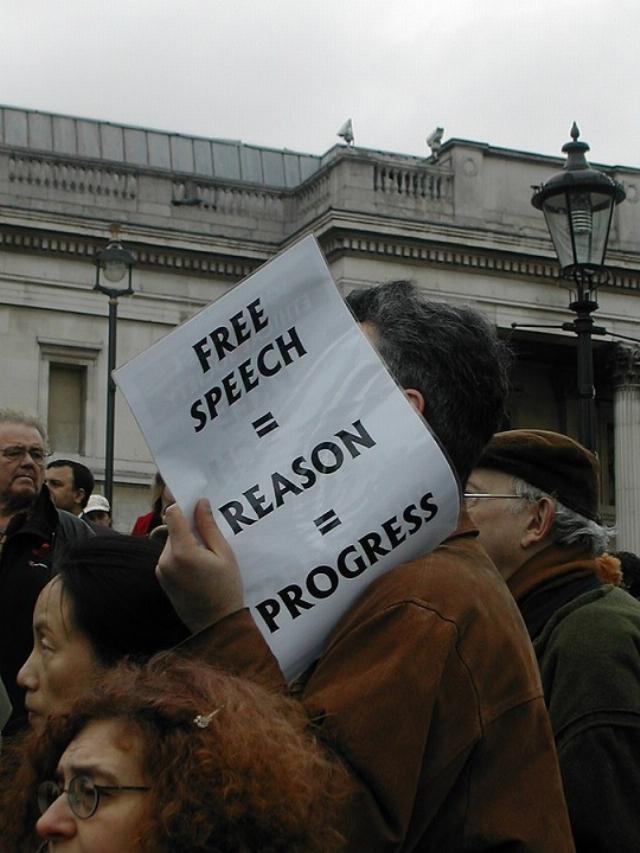
The conservative media sphere was collectively stirred by the recent claim of Justice Ketanji Brown Jackson, during oral arguments in Missouri vs. Biden, that restricting the government’s power to police social media for ‘misinformation’ — the critical issue of the case — would result in “The First Amendment hamstringing the government in significant ways.” Jackson continued, “I’m really worried about that because you’ve got the First Amendment operating in an environment of threatening circumstances from the government’s perspective.”
In unison the right fired back with what seems a self-evident refutation of Jackson’s position — namely that restricting the power of government to tip the speech scales in favor of policies that agree with “the government’s perspective” is the entire point of the First Amendment
But such objections are of course not self-evident. They seem so within the cultural context of what might be called the Old Time American Religion — the civic mythology in which the values of the Declaration of Independence are held to be sacred, the Founding Generation venerated, the Revolution told as a heroic epic, and so forth. But the current American elite progressive class — of which Ms. Jackson is a preeminent avatar — is simply not impressed with the Old Time Religion.
Indeed, the very designation of “progressive” elucidates how this class understands itself relative to this — or any — tradition. Progressivism views politics as an exercise in emancipation from tradition — which is dismissed in toto as a mélange of superstitions and oppressions from a benighted past — and towards a society of maximally free individuals — liberated from the dead weight of religious injunctions — whose autonomy is subjected only to those constraints that any and all rational agents would uphold as necessary for a functioning society, by common sense, or basic decency. Henceforth, this will be designated the Progressive Proposition.
It has long been the contention of “conservatives” — really of non-progressives — that such a project is incoherent, that “basic human reason” and “common sense” do not exist abstracted from particular metaphysical commitments; rather, it is people’s particular metaphysical commitments which materialize into what they perceive as their “basic human reason” and their “common sense.” Hence there can exist no rationally prescriptive, culturally neutral public space. External regulations, regardless of how permissive or restrictive they are, will always emanate and harmonize from some particular social ethos and conflict with others.
<img alt captext="Simon Gibbs” class=”post-image-right” src=”https://conservativenewsbriefing.com/wp-content/uploads/2024/05/progressivism-and-pure-reason.jpg” width=”400″>The vacuity of the presumption that any human has access to Pure Reason, unmediated by culture, is most vividly displayed when its exponents indulge it. Jackson blithely waves away 200 years of free speech jurisprudence with made-up government censorship prerogatives; her position ultimately boils down to “Free speech is good except when the government needs to control information.” Or consider this passage from the New York Times Magazine, on October 13, 2020, citing a “consortium of scholars” who argue that “perhaps our way of thinking about free speech is not the best way… Other democracies, in Europe and elsewhere, have taken a different approach. Despite more regulations on speech, these countries remain democratic; in fact, they have created better conditions for their citizenry to sort what’s true from what’s not.”
Two things are notable here; first, there in both cases, the speaker simply accepts, without hesitation, that a proper function of government is to sort truth from falsehood; second, there is an uncanny lack of any sort of grounding or justification for any point they are making. Both speakers are content to wallow in a morass of subjectivity, with no fixed standards, no signposts, no determinate reference regulating the restriction of speech.
This retreat to subjectivity is merely the other side of the coin of the Progressive Proposition. Jackson, being a progressive, is emancipated from having to exhibit any fealty to the core tenets and traditions of Civic Americanism; the progressive facade allows her the pretense of operating from Pure Reason alone. But being human, and thus lacking access to the Platonic Realm of Form, Ms. Jackson simply replaces the subjectivity of a particular cultural consciousness with the subjectivity of Ketanji Brown Jackson. The scope, limits, and function of the First Amendment hence no longer operate according to a publicly accessible tradition that reflects a cultural consciousness; they operate according to what Ms. Jackson feels is “reasonable.” If Ms. Jackson believes — or better yet, views it as ‘Self-Evident’ — that individuals are bovine creatures easily misled by purveyors of misinformation, and that the government in turn, consists of educated, vetted professionals like herself whose credentials signify superior discernment, then surely the rational limits of free speech should allow for this sort of curation. After all, no one is a free speech absolutist!
The point is not to dwell on Ms. Brown Jackson’s arrogance; she is merely an avatar of her class, which, as evinced by the referenced paged of the NYT Magazine, holds these sorts of views near-unanimously. The point is that no appeal to Pure Reason, or to universally discernible values, can adjudicate the discordance between a Jeffersonian and a ‘Jacksonian’ reading of the First Amendment. Both are committed to ‘Free Speech’ in their own way. The issue is the substance behind the principle. which does not lie within the text itself, but in the particular set of cultural aspirations and shared values that imbues the phrase “Free Speech” with any palpable meaning.
The social fact that there are at least two Americas, means in practice that there are at least two First Amendments. The classical civic American First Amendment is an expression of the cultural commitment to the individual’s right to form his own beliefs without interference from a government that is viewed as inherently corruptible, according to a tradition deriving from the Founding. The progressive First Amendment — like everything else progressive — is an exaltation to the superiority of the professional Elite Class and the benevolence of the government it controls; it views free speech as just another supervised amusement for the masses, for which the elites set up guardrails to prevent them from getting any untoward ideas.
As the progressive elite grows in power, it has come increasingly to rejoice in its own shared consciousness — the consciousness of elites qua elites — and increasingly abhors showing any sort of consideration for the civic American tradition. This class no longer needs to pretend that it is bound to the traditions it despises or the electorate it loathes. It appeals only to its own collective subjectivity as an Elite Class, to its own ever-shifting consensus positions, adherence to which is one of the few conditions to maintaining one’s good standing amongst said elite.
The irony has come full circle. The Progressive Proposition’s allure was its promise to free the individual from being ruled in accordance to arbitrary and alien authority structures and only bow before reason itself. Its end result was to subject everyone to the subjectivity of an arrogant ruling class that brooks no challenge to its vaunted position. Rather than emancipate the population from the injunctions of an angry God, progressivism emancipated the ruling class from the only check on its power, the constraints that the American civic tradition placed over its government, which are ultimately only enforced by a collective consciousness that is committed to this tradition.
Image: Simon Gibbs





